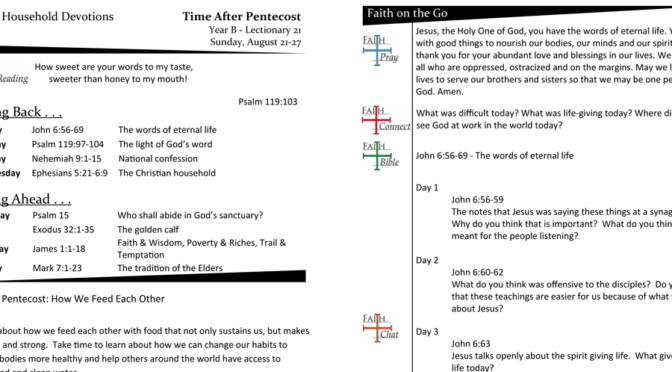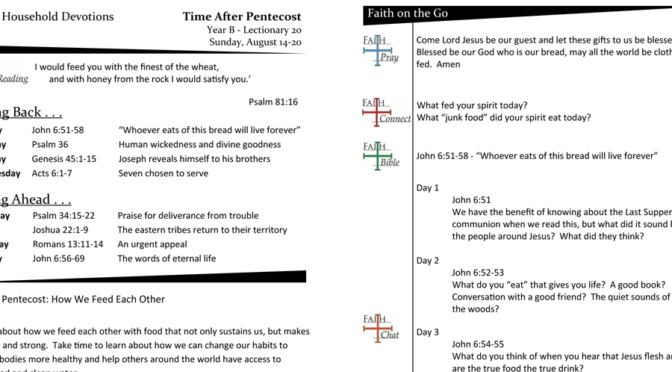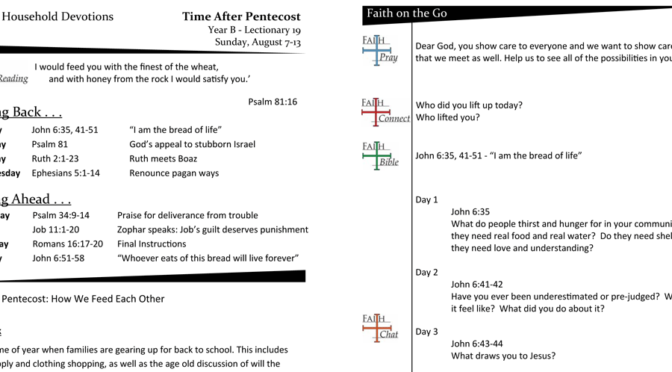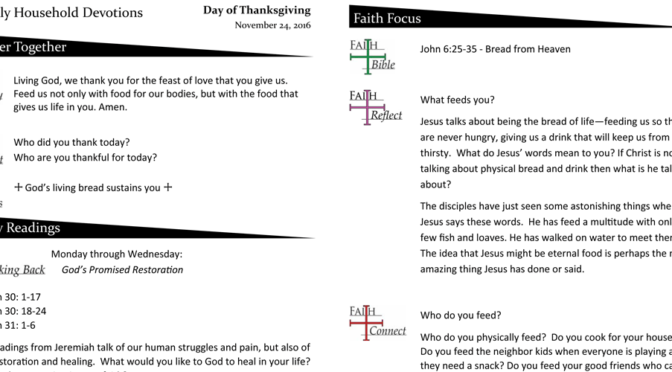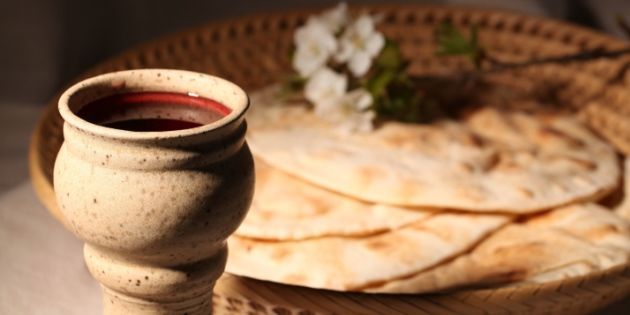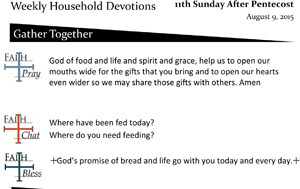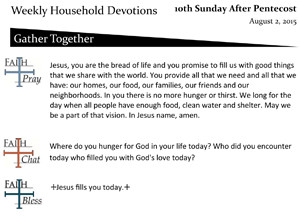*This sermon was preached by Pastor Brigette Weier at Lord of the Hills Lutheran Church in Centennial, CO on July 26th, the first week of the John 6 “Bread of Life” series. For more sermons go to www.alutheransayswhat.wordpress.com
One of the principles of teaching, especially younger children, is repetition, repetition, repetition. When I was a director of a preschool, I had some parents who wanted their children to come five mornings a week, which was fine, I was clear that the curriculum would be the same. They often then said, “oh maybe my child will get bored.” But those of us who have spent any time around young children know that they will want you to read the same book over and over, play the same game with them over and over, sing the same songs over and over, and watch the same video over and over. So we patiently (mostly!) reread the books to them, replay the games, and yes tolerate the same song or video over and over. If you’re lucky, you’ll like some of these activities too! Repetition is how our brains gain mastery over a skill or a concept. Now repetition is not necessarily the exact same thing over and over all the time. It can also be variations on a theme that broaden and deepen our mastery of a skill, or even expand our knowledge within that skill set.
I am a violinist and the old joke of “How do you get to Carnegie Hall? Practice!” is correct! I would practice scales, then etudes based on the scales, then I could play harder and harder pieces that the scales and etudes I had practiced hours and hours prepared me for. All of the hours spent in a practice room, often came along with me in daily life. I would hum the pieces, listen to them on tapes (!) and of course the music would get stuck in my head! As a music major, I lived, breathed and ate music. If you want to get good at something, you need to do it over and over, learning nuances of the skill, until it becomes second nature and part of who you are. Young brains are not the only brains that benefit from repetition for mastery of a skill, those of us who are “a bit older” benefit as well; the more that we see or do something, the better, the more it sticks with us. Professionals in any field will tell you that they have to keep practicing; they have completely immersed themselves in their craft.
This fact is one that has been true from the beginning of creation. The Bible is God’s story of meeting humanity over and over with God’s words and signs of love and reconciliation. God rescuing the Israelites through the Red Sea, God sustaining them in the desert with manna, God giving boundaries for living as community, God revealing God’s work through prophets, God being present in all times and in all places, in exile, in restoration, in the rebuilding of the temple. God tells us the story, sings us the songs and reveals signs of God’s presence over and over and over. God created us to need repetition, to see and hear the story from all of these different experiences. God reveals what God is up to in so many different ways, including revealing Godself in the earthy, fleshy, and tangible Jesus, who walked in our midst as another repetition of God’s love for the whole world.
We have this story that we have heard over and over of Jesus feeding large crowds of people. It is repeated in every gospel. We know it well. It would be simple to reduce our John story today to be about feeding the hungry, proclaiming God’s generosity and abundance in the witness of our human tendency for scarcity, fear of what we don’t understand or Jesus who offers us miracles of God’ power. This witness from John is also those things and those are important concepts to consider: We have enough, God provides and so share! But I figured you might already know that and would want more than an eight word sermon.
Here is what the true miracle is about with these two seemingly unconnected stories of bread, fish and water: God through Jesus is singing to us again a song in a different key, so that we might see and hear again, God’s work of love and reconciliation in the world. The writer of John begins this story with the reminder of all of the signs that Jesus has already shown the people. In the signs, Jesus is revealing to the disciples and to the crowds, that once again that God is doing a new piece based on an old scale. Our 2 Kings reading this morning is an echo of Jesus feeding the people on the grass, with the question of “Is there enough for all?” and the resounding response from God of “Yes!” ringing in our ears. God never gives up on breaking into our ever day lives with abundant love.
This story is one witness of our need to practice gratitude for God’s presence and generosity, to practice being part of a larger crowd, to practice knowing that nothing is simply a left over, everything has value and is not wasted in God’s kingdom, to practice waiting for Jesus and not ditching him (does that bother anyone else?), to practice remembering that Jesus comes to us no matter where we are, and to practice not being afraid. Like the disciples, no matter how much we see God, experience God and encounter God, we forget and rely on our own abilities, what we think we have or don’t have and we think that we can just leave Jesus somewhere on the shore while we head out to sea.
We gather together each Sunday to practice all of these things-and they are a lot! We practice being in community, praying, abundance, generosity, gratitude, hearing the story and being in Christ’s presence. We practice in this space, it’s like our practice room, so that we when we leave, prayer, generosity, hospitality, love, abundance and the story of God’s work in and through Jesus Christ, is second nature and is a little more stuck in our heads, in our hearts and in our actions.
Each time we practice, we hear the story a new way, we encounter Christ in bread, wine, in water, or in the word, we immerse ourselves in the life and love of Christ and this love from God is part of who we are and can’t help but to spill out into the whole world. This week we will host and invite the community and families into our practicing of love, generosity, abundance and gratitude through VBS. The worry of enough room will give way to laughter and close bonds shared, worry of enough snacks will give way to leftovers, fear of things not going just as planned will give way to Jesus coming to us and saying “It is I. Don’t be afraid!” We will all encounter Christ in yet another way that will add to our understanding, we will repeat the stories, the songs and the love of God being revealed in our midst. We will tell the story to one another of God’s abundance, love and how God calls us to immerse ourselves everyday with the practices of repetition of prayers, gratitude, love and generosity of all that God has first given us.
God repeats those themes in us and promises to reveal over and over how we are forgiven, we are loved and how we are sent to share over and over with the whole world that there is enough, there are leftovers-always room for more-and God is with us in every time and in every place. God promises to immerse us with signs of love, generosity, grace and hope today, tomorrow and forever.
I don’t know about you, but I’ll never be bored with the repetition of that story. Amen.

